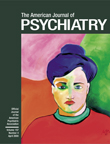Dr. Kales and Colleagues Reply
To the Editor: We agree that the patient’s stage of dementia might affect the degree and type of health care utilization, as well as possibly influencing the ability to report depression. Certainly as cognitive impairment worsens, patients may be less able to articulate changes in affective states.
Depression in dementia has often been thought of as secondary to psychological awareness of decreasing cognitive capacity, hence the impression that depression tends to occur in mild dementia. However, studies have found major depressive disorder even in advanced dementia in which patients were considered beyond the point of self-awareness (1). Depression itself has an adverse effect on functional ability. Thus, in moderate dementia the added burden of depression can determine whether the activities of daily living can be performed or not (and can also affect dementia staging) (2).
Furthermore, the distinction between behavioral manifestations of depression and of dementia itself (e.g., agitation) can be difficult. Conceivably, patients in our coexisting dementia and depression group may have in fact been at a more advanced stage of dementia, in which depression or other behavioral problems became harder to separate. This would make this group a more behaviorally disturbed group, perhaps driving higher psychiatric inpatient utilization than in the group with dementia alone.
Although we attempted to account for medical comorbidity with the mean number of medical diagnoses, this was at best a rough estimate and not as precise as actual comorbidity ratings would have been had they been available. Accordingly, the concerns that Drs. Mago and Berlin raise (that patients with dementia alone had a higher mortality rate, were older, and may have been more likely to have nursing home discharges) may actually be more related to the severity of comorbid medical illnesses than to the stage of dementia.
We agree that there are limitations to the use of retrospective databases. However, these databases also present certain advantages, including the ability to examine longitudinal outcomes for large numbers of patients. In our view, the limitations of the study are outweighed by two significant contributions: 1) this is by far the largest group of patients with coexisting dementia and major depression ever described to our knowledge, and 2) it is the first study to examine health care outcomes for this group in detail, compared to patients with either disorder alone. Furthermore, we believe that the results of the study inform further prospective work.
We concur that a prospective group study is needed to sort out the noted concerns. We are in the process of conducting such a study. With our current study, we are paying close attention to the stage of dementia, as well as to other factors that might confound outcomes and prognoses in patients with coexisting dementia and depression.
1. Greenwald BS: Depression in Alzheimer’s disease and related dementias, in Behavioral Complications in Alzheimer’s Disease. Edited by Lawlor BA. Washington, DC, American Psychiatric Press, 1995Google Scholar
2. Pearson JL, Teri L, Reifler BV, Raskind MA: Functional status and cognitive impairment in Alzheimer’s patients with and without depression. J Am Geriatr Soc 1989; 37:1117–1121Google Scholar



